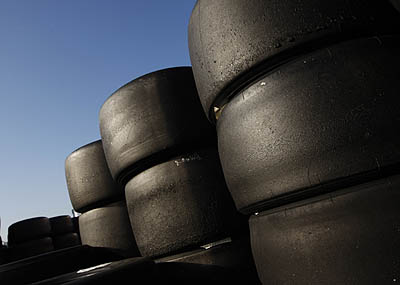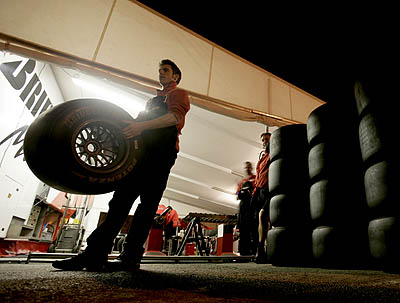


13/11/2009
FEATURE BY MIKE LAWRENCE
 |
Not enough attention has been paid to the withdrawal of Bridgestone. Toyota goes and Sauber, perhaps, steps in, but nobody can replace Bridgestone because nobody else has the data and, because of the FIA's restriction on testing, nobody else can acquire the data.
If you need reminding what a lack of data can lead to, cast your mind back to the 2005 United States GP and its field of six. It was one of the most dismal days in motor racing history. Tens of thousands of fans were robbed at the Speedway and it was not just the price of a ticket, it was the travel, accommodation and the sheer disappointment. You cannot put a price on the disappointment.
The FIA likes to boast about its safety record in F1 and the post-Ayrton Senna period is quoted. The careers of other drivers have come to an end as well. Ralf Schumacher survived a horrendous accident, due to a tyre failure in Friday practice at Indianapolis, but he was never the same driver again. No matter how safely you are secured, the human brain cannot cope with being squished around in the skull.
A tyre failure ended Ralf Schumacher's career. The man had won Grands Prix and you do not do that by being someone's kid brother. Ralf, in his pomp, was special, but he was not the same after the crash.
Two things led to the catastrophe at Indianapolis: a ruling by the FIA which forbade tyre changes and the resurfacing of the Speedway which caused greater tyre wear. Actually, there was a third, which was the cussedness of teams and their refusal to cooperate. They bleat about the importance of the North American market, but when push came to shove, self-interest ruled. I seem to recall someone called Todt (aka Our Great And Glorious Leader) being intractable.
Michelin had supplied tyres for Indianapolis since 2001 and there had been no problems. Michelin has a magnificent history, but it was unable to test on the resurfaced Speedway and the FIA did not demand that it should do so. Nobody at the FIA was able to grasp how marginal F1 tyres are. On many circuits a new set is not up to doing a second qualifying lap, that is how fine the margin is.
Apparently. nobody in the FIA knew this though we lumpen mass of couch potatoes do. We who watch qualifying on TV hear about tyre wear all the time. Martin and Ted keep us informed about tyre wear and tyre behaviour. We proles are informed. We know that Indianapolis was not a Michelin cock-up, it was an FIA cock-up, but Michelin got the blame.
 |
Had Michelin been required to test, they would have had the problem cracked. Then there was the short-lived rule about no tyre changes. I now wonder how that rule came about. It is not possible that the FIA was weighing the dice against the newcomer, Bridgestone. Perish the thought.
Tyres are one of those things we rarely think about unless they need replacing and, these days, that is not often. The cost of tyres per mile of driving has dropped though the floor. I can remember when tyres were a huge issue on my meagre budget, and when there were retreads. Now I feel offended if a tyre wears out. It happened recently, after 45,000 miles of use.
There are two giants in the industry, Bridgestone and Michelin, and they each account for about 30 per-cent of the market, every other tyre maker is small by comparison.
The economic downturn means fewer cars are being sold and each new car comes with five new tyres. The giants of the industry are in pain so the smaller makers must be in agony. The story is being repeated throughout the motor industry. The High Street brands get the headlines, the suppliers of parts to those brands do not, but someone makes the door locks and the seats.
Makers of tyres make a host of other things, like the tracks for caterpillar tractors. Cut-backs across many industries, a long way from the automotive, means there is less call for such. A tractor needs a new track, but there is no need to replace it immediately because work has dried up, so you use a tractor which is idle.
Bridgestone, maker of those round, black, driver excuses has done a wonderful job. Their F1 tyres have been remarkably consistent and there has never been a structural failure of a tyre. If someone's front wing gouges your rubber, that is another matter, that is the baddie in black in 'Ben Hur'.
The FIA suggested to Bridgestone that teams paid for tyres, but Bridgestone wanted out and has behaved correctly by giving nearly 18 months notice. A side-issue is that Bridgestone has been spending so much that nobody would believe the true cost of an individual tyre.
With South Korea due to host a Grand Prize, it struck me that a South Korean tyre maker could have a crack. Ten years ago, Korean tyres were a joke and I am a man who was once obliged to buy East German tyres. They squealed when parked. Korean tyres are making inroads in some grass roots British club racing classes as standard wear. Some are now competent as well as cheap.
Korean makers have huge ambitions, they learned that from the Japanese. No matter how huge their ambition, and how deep their pocket, they do not have the data and they cannot acquire data because the FIA will not permit it.
Tyres is the first thing our new President has to sort out because you cannot run cars without them.
Mike Lawrence
mike@pitpass.com
To check out previous features from Mike, click here